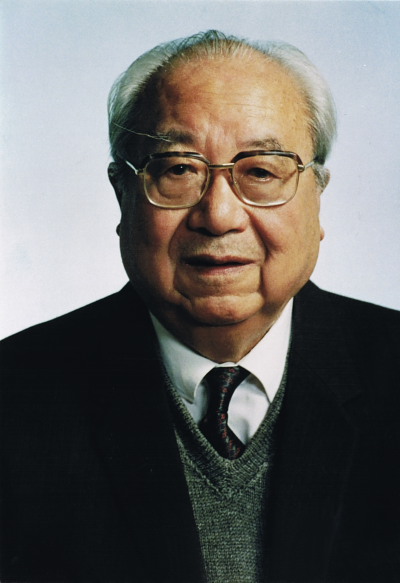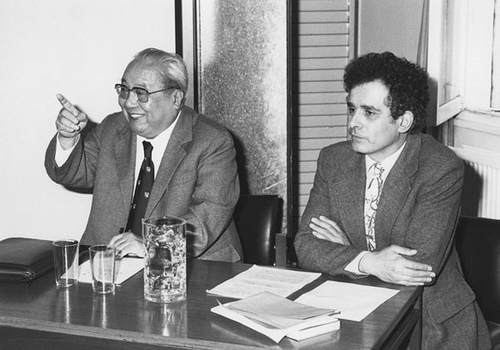<Back to Index>
- Sociologist and Anthropologist Fei Xiaotong, 1910
PAGE SPONSOR


Fei Xiaotong, or Fei Hsiao-Tung (November 2, 1910 - April 24, 2005) was a pioneering Chinese researcher and professor of sociology and anthropology; he was also noted for his studies in the study of China's ethnic groups as well as a social activist. One of China's finest sociologists and anthropologists, his works on these subjects were instrumental in laying a solid foundation for the development of sociological and anthropological studies in China, as well as in introducing social and cultural phenomena of China to the international community. His last post before his death in 2005 was as Professor of Sociology at Peking University.
Fei Xiaotong was born in Wujiang County of Jiangsu province in China on November 2, 1910. His world was one plagued with political corruption and abject poverty. He grew up in a gentry but yet not wealthy family. His father, Fei Pu'an (费朴安) was educated in the Chinese classics, earned a shengyuan civil service degree, studied in Japan, and founded a middle school. Fei’s mother, Yang Niulan (杨纽兰), the Christian daughter of a government official and also highly educated for her time, established a nursery school in Wujiang which Fei attended.
At missionary founded Yenching University (燕京大学) in Beijing, which had China’s best sociology program, he was stimulated by the semester visit of Robert E. Park, the University of Chicago sociologist. For an M.A. in anthropology, Fei went to nearby Tsinghua (Qinghua) University 清华大学 where he studied with Pan Guangdan and learned fieldwork methods from a White Russian, S. M. Shirokogoroff. Fei’s first fieldwork experience, in the rugged mountains of Guangxi province in the far south, ended tragically after Fei’s leg was crushed by a tiger trap, and his young bride Wang Tonghui (王同惠) died seeking help.
From 1936 to 1938 Fei studied at the London School of Economics under the pioneer anthropologist Bronisław Malinowski. "From Malinowski and A.R. Radcliffe - Brown, Fei learned to focus on the functional interrelationships of various "parts" of a community and on the meaning of a culture as seen by its members. He devised survey methods which incorporated the functional approach . . . . " Fei wrote his 1938 Ph.D. thesis, based on earlier fieldwork in Kaixian’gong 《开弦弓》 village, China — not far from where he had been born and raised — and published it as Peasant Life in China (1939).
Among Fei Xiaotong's most important contributions to anthropology is the concept that Chinese social relations work through social networks of personal relations with the self at the center and decreasing closeness as one moves out. Among the criticisms of Fei Xiaotong's work is that his work tended to ignore regional and historical variations in Chinese behavior; nonetheless, as a pioneer and educator, his intent was to highlight general trends, thus this simplification may have had significant justification for Fei's intent, even if they contributed to a bias in studies of Chinese society and culture.
An important work of the period, China's Gentry, was compiled from Fei's field interviews, and was published in the United States in 1953. It went on to become a staple of American university courses on China. The compilation and U.S. publication of China's Gentry grew out of a relationship Fei developed at Tsinghua University with the University of Chicago anthropologist Robert Redfield and his wife, Margaret Park Redfield.
Fei’s analysis of the village economy had convinced him that rural industry was needed to supplement agricultural earnings. Returning from England in 1938 to a war torn China partly occupied by Japanese armies, Fei went to the wartime intellectual center of Kunming in Yunnan in the far southwest, where he and his students studied three villages. In the United States for a year in 1943 - 44, Margaret Park Redfield helped him to translate these studies into Earthbound China (Fei and Chih-i Chang 1945), which again made the case for rural industry.
But in China it was not for his ethnographies that Fei was known (Peasant Life in China appeared in Chinese translation only in 1986!). Fei’s Chinese fame was, rather, as master of lively and engaging articles commenting on society and current affairs. As his popularity increased, so did the quantity of his writings; averaging five to eight articles a month, many were reprinted in books, of which Fei published no fewer than sixteen in the 1940s.
After the establishment of the People's Republic of China in 1949, Fei played an important role in national intellectual and ideological life, and before long he began to hold a growing number of political positions. He was made vice president of the Central Institute for Nationalities in Peking in 1951, and in 1954 attended the First National People's Congress as a member of the Nationalities Affairs Commission.
Soon thereafter, however, departments of sociology were eliminated (as a "bourgeois pseudo - science") . Fei no longer taught, and published less and less. During the “Hundred Flowers” thaw of 1956 - 57, he began to speak out again, cautiously suggesting the restoration of sociology. But then the climate suddenly changed with the “Anti - Rightist Movement.” In 1957, Fei stood with head bowed before countless assemblies to confess his “crimes toward the people.” Hundreds of articles attacked him, not a few by colleagues, some viciously dishonest. Fei became an outcast, humiliated, isolated, unable to teach, do research, or publish. Twenty - three years of his life, he would later write, years that should have been his most productive period, were simply lost, wasted. At the height of the Cultural Revolution, physically attacked by Red Guards, forced to clean toilets, he contemplated suicide.
In the 1970s, Fei, internationally known, began to receive foreign visitors, and after Mao’s death he was asked to direct the restoration of Chinese sociology. He visited the United States again and was subsequently able to arrange the visits to China of American social scientists to help with the gigantic task of training a whole new cadre of Chinese sociologists. In 1980 he was formally rehabilitated, and was one of the judges in the long, televised trial of the “Gang of Four” and others held responsible for the crimes of the Cultural Revolution.
His second life was more than ever that of the public intellectual, with important political posts and contact with policy makers. His influence is thought to have been important in convincing the government to promote rural industry, whose rapid growth in the 1980s raised the income of hundreds of millions of villagers all over China. Virtually every week in the 1990s his name was in the newspapers and his face on television. He traveled all over China, went abroad, to the U.S., Canada, Europe, Japan, Australia, and elsewhere, and was showered with international honors: the Malinowski Award of the Society for Applied Anthropology, the Huxley Memorial Medal of the Royal Anthropological Institute, an honorary doctorate from the University of Hong Kong, and other honors in Japan, the Philippines, Canada. He played a role in promoting and directing the reestablishment of sociology and anthropology in China, training scholars and developing teaching materials after thirty years of prohibition.
Fei Xiaotong is also known for his influential theory on ethnic groups in Chinese history, which follows the tradition of Lewis H. Morgan's stage - developmental evolutionism. A representative example of his work is Fei Xiaotong's 1988 Tanner lecture in Hong Kong, "Plurality and Unity in the Configuration of the Chinese Nationality". According to Fei, the Huaxia became a true ethnic group, the Han, during the Qin Dynasty. Afterwards, the Han became "a nucleus with centripetal force", with their stable agricultural society attracting and assimilating ethnic nomads from China's northern frontier such as the Qiang.
Above all, it was as a writer that Fei flourished in his second life. Virtually all of his old books were republished during these years, and he turned out new books and articles in even greater quantity. Of the fifteen volumes of his “Works” (1999 - 2001), new writings from the 1980s and '90s fill over half. Many of the themes were familiar. He repeatedly and forcefully set forth the case for sociology and anthropology in China if modernization were to succeed. He reminisced about his village fieldwork, his studies, and his teachers. There were articles and books on rural industrialization, small towns, national minorities, and developing frontier areas. He championed the cause of intellectuals. He recounted what he had learned from his trips abroad, and made some new translations from English. There was even a little book of his poetry. What is different in all this new writing is political caution; Fei had too much to do and too little time in these last decades to risk playing with fire again.
He was Professor of Sociology at Peking University at the time of his death on April 24, 2005 in Beijing at the age of 94. A memorial has been set up in the Department of Sociology at the university, where he has taught and directed since the 1980s.
Fei also made significant contributions to the study and management of the development of China's rural economy.
Before his death, Fei held a number of political positions, although these are mostly honorary; he was considered by many to be "active politically".
- Vice President of the 6th Chinese People's Political Consultative Conference;
- Vice Chairman of the 7th and 8th Standing Committee of the National People's Congress;
- Vice Chairman of the Drafting Committee for the Basic Law of the Hong Kong Special Administrative Region of the People's Republic of China;
- Honorary Chairman of the Central Committee of the China Democratic League, a minor party which is part of the United Front led by the Communist Party of China;
- Deputy Director of the Experts Bureau of the State Council;
- Deputy Director of the National Ethnic Affairs Committee;
- Chairman of the Central Committee of the Democratic Union.